All OEMs want to build uniqueness into their solutions. This especially holds true for high performance, powerful platforms such as ATCA. Advantech understands this need for differentiation and plans for it: our design, development, integration, logistics and manufacturing processes have been honed over the years to allow customers to choose the level of customization appropriate to their differentiation strategy.
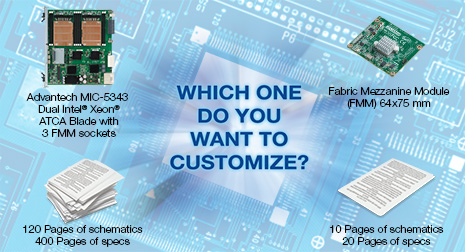 Advantech’s approach is based on mass customization concepts
Advantech’s approach is based on mass customization concepts | 1. | All solutions start with OEM-ready platforms that provide the foundation for customer solutions |
| 2. | Base platforms are configured using COTS technologies for the customer’s target markets such as reference systems and blades(x86, DSP, NPU, Switch) |
| 3. | Application-specific customization and configuration of off-the-shelf building blocks are based on standard AMC products or Advantech’s unique Fabric Mezzanine Modules (FMMs) |
| 4. | Custom designed AMCs, FMMs and Rear Transition Modules (RTMs) provide the ultimate in differentiation |
Advantech calls this approach Customized COTS. We start by using off-the shelf technology to personalize a system solution, and then customize its more modular elements to meet unique customer needs without the costly overhead of an entire ATCA blade redesign. In addition, our modular design approach to platform management software makes customer-specific changes simpler and easier to maintain. All this allows us to deliver tailored solutions that approach the cost-effectiveness, time-to-market advantages and low risk of off-the-shelf solutions whilst retaining the flexibility to apply ODM-like customization, 3rd party IP integration and branding.
The flexibility of our Customized COTS strategy enables a broader range of market and application specific systems topologies for our customers whilst offering the economies of scale of our standard building blocks. Even better, Advantech’s strong commitment to its COTS product roadmap allows Customized COTS users to enjoy timelier technology upgrades at minimum cost.
The Fabric Mezzanine Modules (FMM) concept is one of the key elements in Advantech’s Customized COTS strategy. FMMs are a new denominator for personalizing a common platform at the blade level and they scale extremely well for both I/O and acceleration functions.
FMMs are based on a common specification defining the form factor, high speed interfaces and FRU management. A FRU EEPROM on the FMM describes its thermal & power requirements and zone 2 interface information, while all other aspects are managed by a BMC on the ATCA blade
FMMs are compact, just 6.4 x 7.5 cm2s and use FMC compliant connectors for high speed differential I/O. In fact, there is adequate space to fit 40mm BGA ASICs and FPGAs and associated components with a thermal budget < 20W. The I/O area provides overhang for connector support on front panels or rear transition modules (RTM) making FMMs a good fit for specialized processing close to the application I/O.
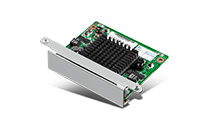
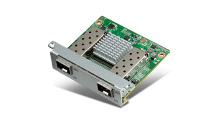
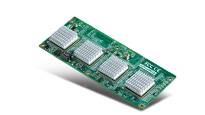
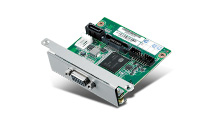
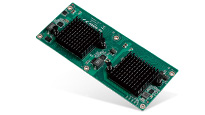
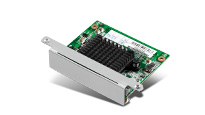
Advantech has defined two types of modules, Fabric mezzanine Type I and Fabric mezzanine Type II, offering different functionality dependent on the host board. Type I FMMs are internal mezzanines with PCIe and fabric connectivity, provide 4x 4 lanes custom fabric, such as XAUI, KR, or KR4. Type II FMMs have the same PCB shape as Type I modules, but support I/O connectors and front panel mounting.
With one PCIe x16 or two PCIe x8 gen.3 ports routed to the front CPU blade, the FMM socket is a perfect solution for I/O port expansion, and also customer-defined acceleration and interfaces. As FMM modules are less complex than AMC modules, customers can deploy faster with a customized design.
For example, there are sufficient FMMs to turn the MIC-5343 common platform into a 100G line card with crypto acceleration.